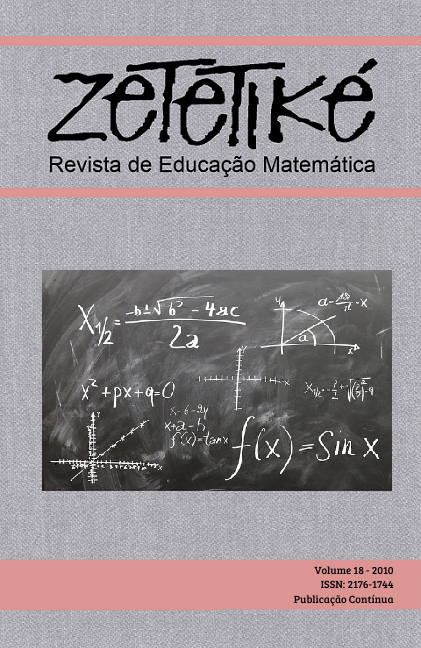Abstract
The initial teacher education is an object of research in education,
mathematics education and other areas of knowledge. It is also the focus of
recent public policies of the Brazilian Ministry of Education, due to the
movement of social and political changes that impact schools and teaching.
Among these changes is the presence and use of technology in educational
activities and the various human social practices. From this perspective,
understanding how these changes are reflected in teaching practice and in the
process of initial teacher education is essential to improve education and
implement changes in schools. Given this, our aim in this article is to offer some
reflections on the possibilities offered by technologies in the process of initial
teacher education, focusing on project work as being able to organize specific,
teaching and technology education. For such, we rely on the results of a study
that has sought to present new insights on the development of projects guided
towards the use of technologies in the education of future mathematics teachers.
The study data highlight aspects of working with projects that promote the
education of future teachers of mathematics, since they offered the study of
specific knowledge, while enabling students to experience situations of teaching
practice and enhance the knowledge of using software in the study of
mathematics.
References
BICUDO, M. A. V.; ESPOSITO, V. H. C. (Org.). Pesquisa qualitativa em Educação: um enfoque fenomenológico. Piracicaba: Editora da UNIMEP, 1994.
BORBA, M. C.; VILLARREAL, M. Humans-with-media and the reorganization of mathematical thinking: information and communication technologies, modeling, experimentation and visualization Mathematical. New York, USA: Springer, 2005. (Education Library; v. 39)
CAVALCA, A. Espaço e representação gráfica: visualização e interpretação. 1997. 169 f. Dissertação (Mestrado em Educação Matemática) – Faculdade de Educação, Pontifícia Universidade Católica - PUC, São Paulo.
CHAVES, M. I. A. Formalização do conceito de função no ensino médio: uma sequência de ensino-aprendizagem. In: ENCONTRO NACIONAL DE EDUCAÇÃO MATEMÁTICA – ENEM, 8., Recife. Anais..., 2004.
CURY, H. N. (Org.). Formação de professores de Matemática: uma visão multifacetada. Porto Alegre: Edipucrs, 2001.
DENZIN, N. K.; LINCOLN, Y. S. The discipline and practice of qualitative research. In: DENZIN, N. K.; LINCOLN, Y. S. Handbook of qualitative research. 2nd. ed. London: Sage, 2000. p. 1-28.
DEWEY, J. Democracia e Educação. 2. ed. São Paulo: Companhia Editora Nacional, 1952. (Coleção Atualidades Pedagógicas, 1952)
HERNÁNDEZ, F. Transgressão e mudança na Educação: os projetos de trabalho. Porto Alegre: Artes Médicas, 1998.
LOURENÇO, M. L. A demonstração com informática aplicada a Educação. In: Boletim de Educação Matemática (BOLEMA), Rio Claro, v. 15, n. 18, p. 100-111, set. 2002.
MALTEMPI, M. V. Construcionismo: pano de fundo para pesquisas em informática aplicada à Educação Matemática. In: BICUDO, M. A. V.; BORBA, M. C. (Org.). Educação Matemática: pesquisa em movimento. São Paulo: Cortez, 2004. p. 264-282.
MALTEMPI, M. V. Educação matemática e tecnologias digitais: reflexões sobre prática e formação docente. Acta Scientiae (ULBRA), v. 10, n. 1, p. 59-67, 2008.
MOREIRA, P. C.; DAVID, M. M. M. S. A formação matemática do professor: licenciatura e prática docente escolar. Belo Horizonte: Autêntica, 2005.
MORTIMER, E. F.; PEREIRA, J. E. D. Uma proposta para as 300 horas de prática de ensino: repensando as licenciaturas para além do modelo da racionalidade técnica. Educação em Revista, n. 30, p.107-113, nov. 1999.
PAPERT, S. Qual é a grande idéia? Passos em direção a uma pedagogia do poder das idéias. Teoria e Prática da Educação, Maringá: DTP/UEM, p. 369-387, 2003. Edição Especial.
PAPERT, S. Situating Constructionism. In: HAREL, I.; PAPERT, S. (Ed.). Constructionism. Cambridge, MA: MIT Press, 1991. p. 1-11.
PAPERT, S. Logo: computadores e Educação. São Paulo: Brasiliense, 1985.
PEREIRA, J. E. D. As licenciaturas e as novas políticas educacionais para a formação docente. Educação e Sociedade. São Paulo: Nacional, v. 30, n. 68, p.109-125, 1999.
RICHIT, A. Projetos em Geometria Analítica usando software de Geometria Dinâmica: repensando a formação inicial docente em matemática. 2005. 215 f. Dissertação (Mestrado em Educação Matemática) — Instituto de Geociências e Ciências Exatas, Universidade Estadual Paulista, Rio Claro.
RICHIT, A. Apropriação do conhecimento pedagógico-tecnológico em Matemática e a formação continuada de professores. 279 f. 2010. Tese (Doutorado em Educação Matemática) — Universidade Estadual Paulista, Rio Claro.
RICHIT, A.; MALTEMPI, M. V. A formação profissional docente e as mídias informáticas: reflexões e perspectivas. BOLETIM GEPEM - Grupo de Estudos e Pesquisas em Educação Matemática, n. 47, p. 91-102, jul./dez. 2005.
RICHIT, A.; MALTEMPI, M. V. Educação Matemática, construcionismo e pedagogia de projetos: perspectivas à formação inicial de professores. Paradígma, jun. 2009, v. 30, n. 1, p.183-204, 2009.
ROLKOUSKI, E. Demonstrações em Geometria: uma descrição dos processos de formação utilizados por alunos de Licenciatura em Matemática em ambiente informatizado. 2002. 165 f. Dissertação (Mestrado em Educação) – Setor de Educação, Universidade Federal do Paraná, Curitiba.
ROSA, M. Role playing game eletrônico: uma tecnologia lúdica para aprender e ensinar Matemática. 2004. 184 f. Dissertação (Mestrado em Educação Matemática) — Instituto de Geociências e Ciências Exatas, Universidade Estadual Paulista – UNESP, Rio Claro, São Paulo.
SCUCUGLIA, R. A investigação do teorema fundamental do cálculo com calculadoras gráficas. 2006. Dissertação (Mestrado em Educação Matemática) – Instituto de Geociências e Ciências Exatas, Universidade Estadual Paulista, Rio Claro, 2006.
VALENTE, J. A. Desenvolvendo projetos usando as tecnologias da informação e comunicação: criando oportunidades para a construção do conhecimento. Teoria e Prática da Educação, Maringá, p. 407-422, 2003. Edição Especial.
ZAIDAN, S.; PEREIRA, J. E. D. A quem cabe formar o professor da escola básica? Presença Pedagógica, v. 4, n. 20, p. 89-92, mar./abr. 1998.

This work is licensed under a Creative Commons Attribution-NonCommercial-NoDerivatives 4.0 International License.
Copyright (c) 2014 Zetetiké: Revista de Educação Matemática

